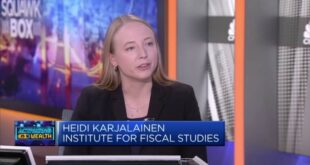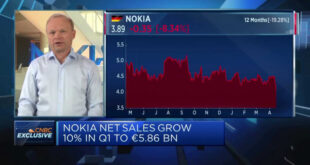
Luke MacGregor | Bloomberg | Getty Images
Postcards showing the British Union flag, also known as Union Jack, sit on display at a souvenir store near to the Elizabeth Tower, also known as ‘Big Ben’, in London, U.K.
The logistics are not as simple for non-European banks such as Japan’s MUFG, which recently picked Amsterdam as its EU commercial banking base. CNBC asked Nobuyuki Hirano, chairman of Bank of Tokyo-Mitsubishi UFJ and CEO of parent company Mitsubishi UFJ Financial Group, whether there would be job losses in the London office as a result of the move.
“Of course there should be some move of the talents — in particular salespeople,” he said, adding that the group was moving some of the sales team not only to Amsterdam, but also Frankfurt.
When it comes to Brexit bragging rights for European cities in line to steal London’s financial crown, the jury is still out.
Unsurprisingly, Cryan told CNBC he only has eyes for Germany: “I do think that Frankfurt will benefit the most. I think it will be the clear winner of the other European centers.”
But not everyone sitting at the Singapore Summit agreed.
Jean Lemierre, chairman of BNP Paribas, said there is enough of London’s banking pie to go around.
“If negotiations are such that there will be new allocation of resources across the continent, it will go to various places,” he said. “It will go to Frankfurt, to Amsterdam, to Dublin and of course, to Paris. And Paris is well placed.”
When Cryan was asked to respond to Lemierre’s endorsement of Paris, he offered this explanation: “He may be biased.”
Something the banking bosses can all agree on, however, is that nobody wins in a hard Brexit.
Topping Cryan’s wish list for a “friendly” outcome is a longer transition period, and Barclays ‘ McFarlane agreed: “We’ve asked for an implementation period because this is a very difficult area and two years is not all that long.”
Cryan cited the risk of losing passporting rights, or the loss of equivalence between the European Union and the U.K. as reasons to prepare for the worst.
McFarlane, who also serves as chairman of financial industry group TheCityUK has delivered his own list of recommendations directly to the government.
“We’ve given good advice on what is sensible to move, what’s sensible to retain and what of the foreign activities in London is sensible to retain and how that should be gone about.”
The big unknown that’s keeping the contingency plans in tact is whether Brussels and the U.K. can agree to put those recommendations in place.
 EU News Digest Latest News & Updates
EU News Digest Latest News & Updates


